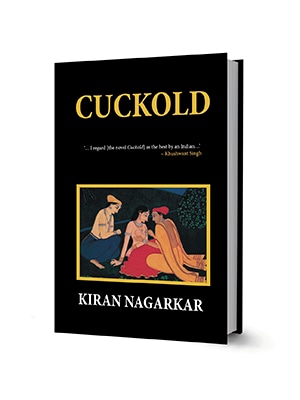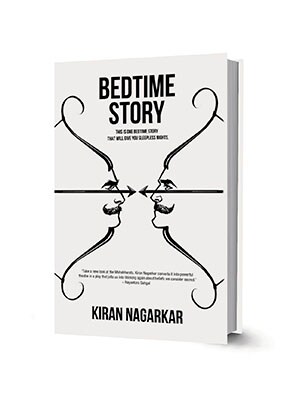Kiran Nagarkar: I write because I want to be read
The written word can be powerful only if readers are paying attention, says award-winning novelist and Mumbai boy Kiran Nagarkar


Kiran Nagarkar wants to shake people, catch them by the scruff of their neck and make them read his stories. “What I want my books to do is what [Samuel] Coleridge did with The Rime of the Ancient Mariner,” he says. In the poem, the mariner waylays a wedding guest and forces him to listen to his story. And like the guest, the reader leaves Nagarkar’s novels wiser.
This year, the Mumbai LitFest honoured the novelist and playwright with the Tata Literature Live! Lifetime Achievement Award. The 73-year-old storyteller from Mumbai, whose craft is as strong as his plots are gripping, talks to ForbesLife India about the pitfalls of ignorance and apathy, the purpose of fiction, and two of Mumbai’s favourite heroes, Ravan and Eddie (introduced in Ravan and Eddie, 1994). Excerpts from the interview:
Q. When Bedtime Story was first staged in Marathi in the 1990s, it was met with uproar and demands for it to be banned. Have we changed as a society since then?
The play was performed in 1995, and it was first written in Marathi in 1977 during the Emergency. But then the Emergency was lifted the Opposition came up, and won hands down in the elections. And I thought, ‘Ok, everything’s changed. My play has become irrelevant now because it is about responsibility’. But some Marathi critics felt I was damning the whole of society, which is very true. But first, I was damning myself. In the introduction it is very clear that I am aghast at my lack of knowledge and the fact that being ignorant is infinitely worse than being indifferent. And of course, I am also condemning apathy and indifference.
Things have changed infinitely for the worse. The space for writing has shrunk to a point which is disastrous because, from the time that Bedtime Story was banned, I have been censoring my own way of thinking. The fact that the authors woke up to protest [the growing intolerance]—it may be a little bit late—is good. But when is the populace going to wake up? Q. You won the Sahitya Akademi Award for Cuckold (1997), where you recreate medieval Mewar. What made you write a historical novel? Were you influenced by Shivaji?
Q. You won the Sahitya Akademi Award for Cuckold (1997), where you recreate medieval Mewar. What made you write a historical novel? Were you influenced by Shivaji?
I never thought I would write a historical novel, but I did write Cuckold. It came as a complete shock to me. Perhaps the two subjects from India that have truly intrigued me are Subhas Chandra Bose and Shivaji.
Shivaji’s escape from Agra is amazing. Nobody knows exactly how it happened, but let’s take it at its lowest possible imaginative level. He was called to Agra for a huge big durbar (at Aurangzeb’s court). He was made to sit either somewhere at the back of the middle or right at the back. He didn’t go into heroics. He sat there quietly. He thought, I suspect, and I think I might just be right, ‘If I wait, I can get back. I’ll bide my time before I make my gestures’. In Cuckold, my Maharaj Kumar is telling his father that he had lost the battle, when he had no reason to lose it. It is the most important battle that they fought with Babur at Khanwa. Babur had 12,000 people, he had one lakh. But Maharaj Kumar keeps telling his father, “So we lost… so what? We will gather our forces, we will get the best equipment, he’s talking about canons, and we’ll strike back. Let’s have patience for two-three years.” Shivaji had that.
Do you know what [Govind] Pansare (author of Shivaji Kon Hota, a best-selling biography of the ruler) who was shot dead told me, about 11 months before he died [in February 2015]? “Kiran,” he said. Oh, he called me Nagarkar. “You take all the revenue systems for agriculture. None, none, was better than Shivaji’s.” Here is a Marxist scholar supporting a king. And that too, a self-made king. You don’t have to glorify Shivaji. Let’s not forget that he killed Afzal Khan. But my Maharaj Kumar is doing the same thing in Cuckold. He almost forces 10,000 people into the quicksand. These are the dilemmas that are posed.
One could write a terrific book about Subhas Chandra Bose. There are major ethical problems. Why do the Bengalis and the absolute majority of Indians not want to confront this? He was absolutely in awe of Mussolini and Hitler. There is written proof that he wanted dictatorship for India, at least for a few years after Independence. What is the point of getting freedom?
Q. Do you think that Cuckold did not get the fame it deserved?
Sure. I was very unhappy that my book did not do well. Let me just put it this way: I wanted people to read my book. I write because I want to be read. I write because, rightly or wrongly, I believe in entertainment. What I want my books to do is what [Samuel] Coleridge did with The Rime of the Ancient Mariner. Remember that man who comes out from the wedding hall for a breath of fresh air to meet this other guy who tells him the story of the mariner. I believe that you have to catch the reader by the collar and shake him just like Coleridge did. And the story was so gripping. That is what I want to do with my readers.
Q. If Ravan and Eddie were alive, they’d be in their late 60s. What would they make of Mumbai today?
I think they would be horrified. If Ravan and Eddie had heard that the chawls were going to be removed, they would have jumped for joy. The slums in that sense may have gone, but they are now six-, seven- and eight-storey buildings coming up. They are almost like jails, cubby holes maybe 250 by 300 ft. We have absolutely no idea that the first thing about human beings is that you give them dignity. The essence of architecture is, of course, air, light and privacy, but just as central is the concept of dignity. Why would Ravan and Eddie be happy? These politicians are behaving exactly as the coloniser though many of them may have come from chawls themselves.
Q. But would they have been any different if they were successful?
I don’t know what would happen to me if I became a minister. But this is speculative. In the last book (Rest in Peace, published in 2015), they hit rock bottom. They go back to the chawls (CWD chawls) to find them in a much worse condition. But I will never call Ravan and Eddie survivors. They are a hundred times better than survivors. They are Bombaiyya people, yaar. They have no choice but to reinvent themselves. In the end, they start a funeral service. It is the first Hindu funeral service. They don’t know how to give up, which is why I love them.
Q. Let’s talk about the craft of writing. How do you get inspired?
I don’t think there is anybody on the face of the earth who can solve this mystery: The visitation as I would call it. The Greeks used to call it the muse, but it has been there forever. Think of the times that we had 2,000 years ago. Panini wrote his grammar. Can you imagine what a feat of analysis it is? It is staggering. You take our friend (VÄtsyÄyana) who wrote the manual of sex, the Kamasutra. The breath of vision that these people had, and I’ve not even reached the Upanishads. I’m not even talking about KÄlidÄsa or the great playwrights. And you can’t even say that it was an act of courage.
They took openness as the basis of life. I forgot the name of the playwright who wrote about the life of Sita in those days. Imagine Sita rebelling. It’s alright for Kiran Nagarkar to do that with Draupadi rebelling (in Bedtime Story). I’m from the 20th century. What’s the big deal? Read Kabir and you want to hit your head on the wall. He’s amazing. Dnyaneshwar was 21 or 22 when he took samadhi. We have this incredible heritage, and what are we doing with it?
Q. After Chetan Bhagat, we have seen a lot of popular writers who have managed to make money and sell their books. Have you tried reading these books?
Now you are getting there. You have caught me red-handed. Gore Vidal, one of my favourite writers, said, “You can be superior, but read and analyse these books and then talk about it if you want to.” I have not read these books. I don’t have the courage to read them. My only comment is that I would find it difficult to live with myself after reading them. The reality is that I’m not reading at all. But recently, I came across The Blind Lady’s Descendants, a book by Anees Salim. I trust his talent. I would like to tell him to write more. Q. Have you considered converting your books into comic books or graphic novels?
Q. Have you considered converting your books into comic books or graphic novels?
Yes. But who will do it for me? I am not an artist. Actually so many producers had talked about converting my work into movies. But that never happened. I want to make audio books.
Q. Have you watched any new Hindi or Marathi films? Are they relevant to our times?
By and large, I would agree with you. Hindi and Marathi films are taking in current topics and that is a good thing. Two days ago, I saw Talvar (2015). In the first half, there is tension and the meat is real. But when the second guy comes into the picture, I feel that the seriousness is gone. I think even Irrfan [Khan] has gone out of hand and the two sides are only scoring points over each other. There is no scoring points, sir. We are talking about two lives. But I would like to doff my hat and tell Meghna Gulzar that she has done an excellent job. With the Marathi movie Court (2015), I had a very serious problem. What Court lacks is something Talvar manages very well. People’s lives are being ruined, but that doesn’t come across in the film [Court].
Q. Do you miss poets like Dilip Chitre and Pula Deshpande in this environment?
Much more so Arun Kolatkar, with whom I had worked in advertising. For humour to be serious, you have to have an ethical compass. Because one of the dangers of humour is that it can get too sentimental. For instance, you can only romanticise chawl life so much because, by itself, it has little to recommend it.
Q. Does fiction have the power to bring about change in society?
Is fiction powerful? Only if people are paying attention. But who’s paying attention?
First Published: Dec 25, 2015, 06:08
Subscribe Now(This story appears in the Sep 10, 2010 issue of Forbes India. To visit our Archives, Click here.)